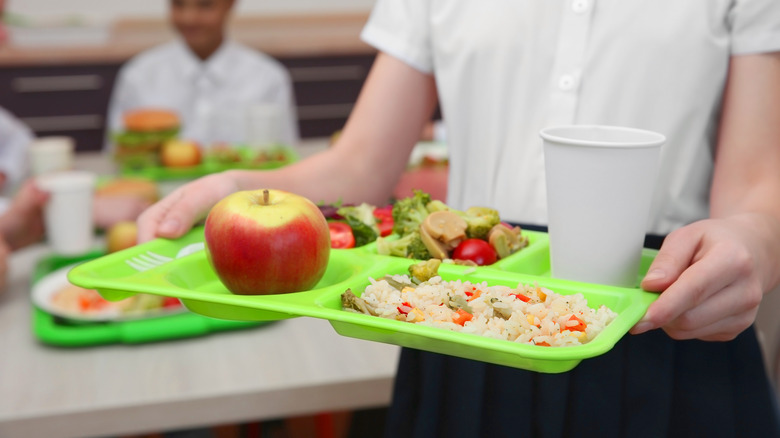New Data Reveals A Startling Issue With School Lunches In The UK
When children go to school, they can bring a pre-packaged lunch from home or purchase lunch in the cafeteria. For many students, buying lunch is a convenient way to save time while getting ready for school — for others who benefit from free lunch programs, it may be a way to ease financial burdens.
The UK does uphold some regulations regarding school lunches and nutrition, according to the government website. They state that school-provided meals must include high-quality protein, fruits, vegetables, bread, cereals, and potatoes. They also say schools cannot provide sugary drinks, cookies, chocolate, or candy, and serving fried foods is restricted to twice a week. Despite these restrictions, it is possible for schools to slip in cheaper alternatives — and there is no way to restrict what children bring from home.
In the UK, around one in five students receives free meals from school, as reported by the BBC, totaling around 1.7 million children. They estimate that 2.6 million children live in households struggling to provide healthy meals, and those children could rely on schools for meals each day. A new study has revealed that school lunches may not be as nutritious as they should be — and could actually be contributing to obesity and health issues.
More processed foods carry health risks
In a study conducted by Imperial College London, results showed that around 75% of calories in all school lunches come from ultra-processed foods like breads, snacks, puddings, and sugary drinks. The study examined the lunches of 3,300 children across primary and secondary schools and found that secondary school lunches, on average, contained more calories from processed foods than primary school lunches.
While the study does note that lunches brought from home often contained more processed foods than school lunches, they did find that school lunches still included high amounts — packed lunches get around 82% of their calories from processed foods, while school-provided meals were about 64%.
The added calories and sugar from processed foods in lunches could contribute to an increased risk of childhood obesity and health issues, reports Bloomberg. The National Child Measurement Programme found that 10.4% of 4- and 5-years-olds in England were obese, as well as 23.5% of 10- and 11-year-olds.

